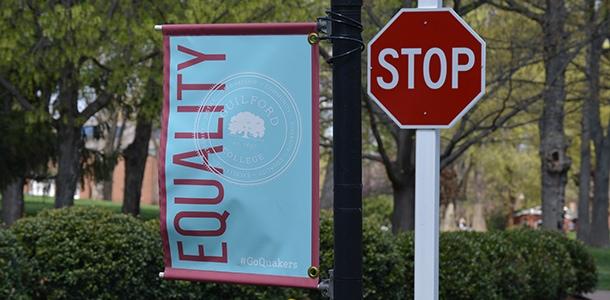Guilford College is currently addressing a $2 million deficit for this year and the prospect of an additional $2 million deficit for 2015-16. Positions have already been cut, and in the coming weeks President Jane Fernandes will propose further cuts in order to balance the budget.
At the same time, another issue has emerged: salary inequity. Guilford has a well-documented history of underpaying faculty and staff relative to peer institutions while paying administrators’ salaries at or above average.
When it came to light that executive pay rose again last year, members of the community expressed outrage. Now, the community is working to figure out how to prevent this from happening again.
The Setup
In 2009, Guilford was much more fiscally stable than today.
“At that time, enrollment, donations, giving and alumni engagement were at an all-time high,” said Fernandes.
However, it did not last. In 2011 and 2012, both federal and state governments reduced aid programs available to students.
This led to a sharp decline in enrollment and revenue. According to Guilford’s IRS Form 990’s, a tax document all nonprofits file, revenue from tuition and fees dropped 15 percent between 2009 – 2010 and 2013 – 2014.
Despite this, the school continued to spend money to create new programs. It also maintained its staffing levels: Guilford employed the equivalent of 398 full-time employees in 2014, only five fewer than in 2009.
When Fernandes was hired in spring 2014, she, like the rest of the school, did not realize how bad the budget situation would become.
“I remember back in April last year, I was told that we could expect a deficit of $235,000,” said Fernandes. “I lost sleep over that. Then as the months passed from April to when I started in July to the board meeting in October, the (projected) deficit went from $235,000 to $2 million.”
Guilford’s History of Inequity
During this period of economic instability, faculty and staff salaries remained unchanged. When adjusted for inflation, the average salary for full professors dropped $3,941 between 2009 – 2010 and 2013 – 2014. The average salary for associate professors, assistant professors and instructors lagged as well, according to the Chronicle of Higher Education.
Additionally, faculty salaries lagged relative to institutional peers such as Roanoke College in Virginia and Carthage College in Wisconsin. Among these schools, Guilford ranked last in the 2014 – 2015 American Association of University Professionals faculty salary survey. Guilford paid its faculty below the peer group median for all ranks: full professors alone were $14,800 below.
Salaries for all faculty and staff ranks were well below the average for baccalaureate institutions nationwide.
The same has not been true for the highest levels of Guilford’s administration.
“If you’re just looking at comparisons, it’s an odd sort of structure in that you have some highly compensated presidents and VPs compared to very lowly compensated faculty,” said Julie Winterich, associate professor of sociology and anthropology and a member of the Salary Equity Group, a group of faculty that has studied Guilford’s faculty compensation.
Between 2009 – 2010 and 2012 – 2013, the total compensation of Guilford’s seven top executives rose 15 percent according to the IRS Form 990’s where Guilford reports executive compensation.
Some administrators’ reportable compensation, which excludes benefits like health insurance, indicated they may have made more than similar professionals elsewhere. For example, the AAUP reports that in 2014-15 the median salary for chief financial officers at baccalaureate institutions was $145,000. But in 2012-13, Guilford paid its VP for Finance $165,653.
A Disturbing Discovery
Much of the information about administrator pay was already available to the community because the IRS requires nonprofits to make their 990’s public. So, when faculty members were interested in the 2013-14 form filed Feb. 13 of this year, they went to Interim VP for Finance Jimmy Wilson, ‘84.
When Wilson provided them with the forms, they were stunned by what they saw. Nearly every administrator saw an increase in reportable compensation over the previous year. All told, total administrator compensation increased 12 percent over the previous year’s filing.
“The faculty were concerned, because faculty salaries have been frozen and faculty positions are being cut,” said Clerk of Faculty and Professor of Geology and Earth Sciences Dave Dobson, who asked Wilson for the form. “The institution is undergoing budget restructuring and all that, so it seemed like a bad time to be significantly increasing administrator pay.”
Faculty sprang into action. A faculty meeting was called for March 25, during which many faculty members expressed outrage and began to plan their next step. Some faculty went as far as to call for administrators to return the apparent bonuses.
Questions & Answers
The question on everyone’s mind: why were these compensation increases paid out as Guilford plunged into a financial crisis?
According to Fernandes, who has been working with the board of trustees on this issue, the compensation increases go back to 2009-10. At that time, President Kent Chabotar was planning his retirement from the presidency.
“Because everything was going so well, there was concern that maybe some of the senior staff members would look for another job and go to another job because they knew that President Chabotar might be thinking about retiring,” said Fernandes. “So, President Chabotar recommended to the board that each of the senior officers be offered a retention agreement.”
The retention agreements stipulated that if the officers stayed until 2013-14, when Chabotar announced his retirement, they would receive a payout ranging anywhere from about $15,000 to $50,000.
Offering retention agreements at all struck many in the community as unusual. Retention agreements are more common in the corporate world and are used to keep the best executives together during acquisitions and away from competing firms.
“I’m not aware that it’s done in higher education,” said Fernandes. “In my experience, I’ve never been at a college that used retention agreements at a time of presidential transition.”
Now that the agreements have been paid out, a number of recipients are leaving or have left. Aaron Fetrow, former dean of students and VP for student affairs, and Gregory Bursavich, former VP for finance, left Guilford after receiving their payments last year. Additionally, Academic Dean and VP for Academic Affairs Adrienne Israel announced her intention to step down at the end of the spring 2015 semester.
Fetrow declined to be interviewed for this article, citing the non-disclosure clauses in the contracts he and his former co-workers signed with the college.
The spike in Chabotar’s compensation came from a different source. As part of his contract with the college, he had a deferred compensation plan. Each year Chabotar remained president, Guilford would contribute a certain amount to the plan and after a certain number of years, the plan would pay out a lump sum.
In 2013-14, Chabotar received a payout of about $88,000. This was not the first time either; he received a similar payout in 2010-11.
“Deferred comp is sort of a retention agreement in a way because it’s putting something out there to make it attractive not to leave your employment,” said Wilson. “If you’re trying to keep a president or somebody like that, its obviously a big incentive not to leave.”
Chabotar declined to be interviewed, citing a lack of knowledge, but encouraged students to listen to information coming from the administration.
Current Cuts
Guilford’s budget crisis has affected everyone on campus. The religious studies department has already announced that they will no longer teach Islamic and Judaic Studies.
“From the perspective of the college, it’s really a big loss,” said Betsy Mesard, visiting assistant professor of religious studies. “The department is pretty important given that it’s a Quaker school.”
Some faculty and staff have already seen their positions jeopardized.
“We’ve already seen cuts to the faculty, including in our department: a colleague who’s having a baby a month before Guilford is terminating her position,” said Associate Professor of Religious Studies Eric Mortensen. “(It’s) very painful.”
The colleague in question is Mesard.
“This is my first year and my only year, it turns out,” she said. “(My position) was approved during the final year of the previous president, but the new president reevaluated all of those positions and (mine) was not reapproved as a permanent position.”
The same has happened to not only new faculty members, but also long-serving faculty.
Fernandes told the faculty in a meeting on April 15 that Guilford will have to eliminate the equivalent of 40 full-time staff positions and 17 full-time faculty positions. She emphasized that no programs or departments would be eliminated, but that everyone must do their best to save money.
Equality, stewardship, community
On April 8, in the West Gallery of Founders Hall, the Clerk’s committee hosted a forum open to the community to discuss fair and equal compensation policies for Guilford. Faculty, staff members and students, including Fernandes, attended the forum.
Members of the committee presented alternative compensation structures used at other liberal arts colleges.
“I think its wonderful to compare, but what we have to do at Guilford College is discern our values and our principles, what we want on this campus and become the model for other campuses,” said Project and Communications Manager Delilah White.
Many shared their concerns about the salary policies currently in place.
“There shouldn’t be faculty and staff members who are struggling to make a minimum wage a living wage,” said junior Teresa Bedzigui. “There shouldn’t be a culture of faculty members not being able to speak their minds.”
One of the results of the forum was the setting up of a committee to directly address pay inequity at Guilford.
“Now will be the time that people come together to address long overdue concerns,” said Teresa Sanford, IT&S applications administrator. “I saw a real surge in unity to get that done.”
However, some feared that progress would be lost amidst the flurry of committees.
“I was one of the people that said, ‘Let’s push it to the board (of trustees) and have them come back and do the right thing about salaries,’” said Professor of Mathematics Rudy Gordh. “If they don’t, I think we should revolt.”
Community members have questioned if the core values actually influence institutional behavior.
“Equality, although not directly related to these budget cuts, is still a problem at Guilford,” said Mortensen.
Others believe these core values are long gone and that a new set prevails.
“I came up with a list that I call ‘rotten-to-the-core values,’” said Professor of Art Roy Nydolf. “Anti-community, elitism, hypocrisy, inequality, anti-ethical, poor stewardship, insensitivity and inhumanity.
“All this information has been a great big secret, so it’s shocking as it’s coming to light. It makes me sick.”















Cate Schurz • Apr 18, 2015 at 8:17 am
This is excellent reporting and well-written/edited. Always proud to have been a member of such a quality newspaper. Props to everyone from London xx